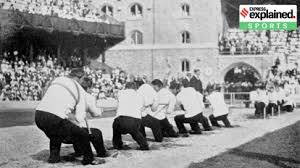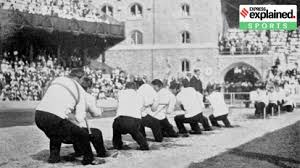
The Olympic Games, a global stage for showcasing athletic prowess and international camaraderie, have evolved significantly since their inception. Over the years, the roster of sports has changed, with some being added and others removed based on various factors, including popularity, global reach, and logistical considerations. Here are five sports that were once part of the Olympics but are no longer contested:
Table of Contents
1. Tug of War
Olympic History
This sport, which involves teams pulling on opposite ends of a rope, is a test of strength, teamwork, and strategy.
Reasons for Removal
The International Olympic Committee (IOC) decided to streamline the number of sports in the Games, and Tug of War, despite its historical roots, was deemed less relevant in the context of modern Olympic competition. The sport was also seen as more of a recreational activity rather than a competitive sport suitable for the Olympics.
Legacy
Tug of War remains a popular sport in various local and international competitions and is governed by the Tug of War International Federation (TWIF). It is remembered fondly as a unique part of early Olympic history.
2. Croquet
Olympic History
Croquet made its sole appearance in the Olympics in 1900, during the Paris Games. The sport, which involves hitting wooden balls through a series of hoops embedded in a grass playing court, was a demonstration of precision and control.
Reasons for Removal
Croquet’s brief Olympic tenure was marked by a lack of international participation and interest. Only French players competed in the 1900 Games, highlighting its limited global appeal at the time. Consequently, it was dropped from the Olympic roster.
Legacy
Croquet continues to be enjoyed as a recreational and competitive sport in various countries. The World Croquet Federation (WCF) oversees international competitions, ensuring the sport’s ongoing presence and development.
3. Polo
Olympic History
Polo was included in the Olympics in 1900, 1908, 1920, 1924, and 1936. The sport, which involves teams on horseback using mallets to hit a ball into the opponent’s goal, was a display of equestrian skill and strategy.
Reasons for Removal
Polo’s removal from the Olympics was influenced by its high costs and the logistical challenges of transporting horses. Additionally, the sport’s limited accessibility and popularity in certain regions made it less viable as a global Olympic event.
Legacy
Polo remains a prestigious sport, with numerous international tournaments and championships. The Federation of International Polo (FIP) continues to promote the sport worldwide.
4. Baseball and Softball
Olympic Histor
Baseball was first introduced as a demonstration sport in the early 20th century and became an official Olympic sport in 1992. Softball followed suit in 1996. Both sports were dropped after the 2008 Beijing Olympics but made a return for the 2020 Tokyo Olympics.
Reasons for Removal
The decision to remove baseball and softball after the 2008 Olympics was based on several factors, including their popularity primarily in the Americas and East Asia, the dominance of professional leagues like Major League Baseball (MLB), and scheduling conflicts. The return of these sports in 2020 was a result of local interest and advocacy by the host nation, Japan.
Legacy
Despite their on-again, off-again status in the Olympics, baseball and softball are widely played and cherished sports around the world. Organizations such as the World Baseball Softball Confederation (WBSC) continue to develop and promote these sports globally.
5. Lacrosse
Olympic History
This fast-paced sport, which involves teams using long-handled sticks to catch, carry, and shoot a ball into the opponent’s goal, showcased the athleticism and skill of its players.
Reasons for Removal
Lacrosse’s removal from the Olympics was due to its limited international reach and participation at the time. The sport was primarily popular in North America, and there was insufficient global interest to sustain its inclusion in the Olympic program.
Legacy
Lacrosse has grown significantly since its brief Olympic stint. It is now played in numerous countries, and international competitions are organized by the Federation of International Lacrosse (FIL). There is ongoing discussion about potentially reintroducing lacrosse to the Olympic Games.
Conclusion
The Olympic Games have always reflected the changing dynamics of sports and global interests. The removal of certain sports like Tug of War, Croquet, Polo, Baseball, Softball, and Lacrosse underscores the evolution of the Games and the efforts to ensure a diverse and inclusive representation of sports that resonate with a global audience. While these sports may no longer be part of the Olympic program, their legacies endure through continued participation and international competitions, keeping the spirit of athletic excellence and competition alive.








